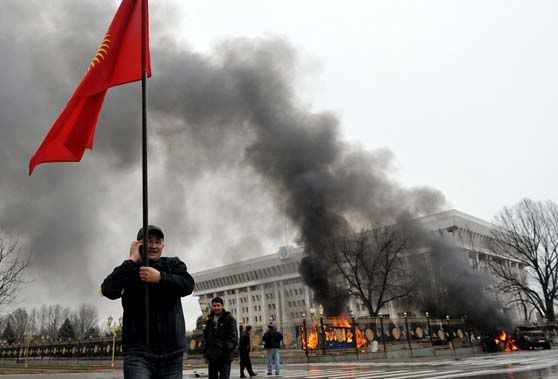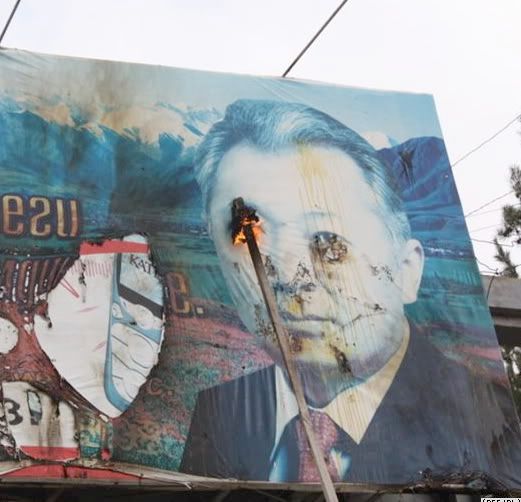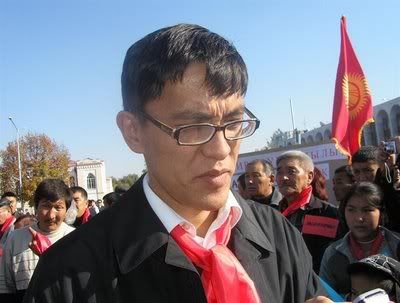Déjà vu in Kyrgyzstan 5 Years Later?

About a month ago I was briefing a group preparing to do an assessment of development projects in Kyrgyzstan. When they asked me to describe the biggest threats of conflict in the country, I said corrupt governance and the question of succession. The group looked puzzled and said that they had understood that politics were completely controlled in Kyrgyzstan now that Bakiyev had “eliminated” opposition. I countered by saying that Bakiyev’s government is not like that of Nazarbayev in Kazakhstan; it can never “eliminate” or even completely control opposition. Given the corrupt and weak nature of governance in Kyrgyzstan, Bakiyev may be able to temporarily control opposition to his government by force, but, like spring flowers, opposition will always re-emerge and will require constructive engagement to avoid conflict.
The past couple of days in Kyrgyzstan have suggested that this is indeed the case. The news coming out of the country looks all too similar to that which we saw in Spring of 2005, only more violent. In general, the events of the last several days taken together with those of March 2005 suggest two things about this country in the twenty-first century – 1) that the Kyrgyz people, unlike most former Soviet citizens, are unwilling to allow a corrupt government to stay in power through its control of the political system and are ready to risk personal safety in order to prevent this; and 2) the elite of Kyrgyzstan has yet to demonstrate that it is capable of establishing a viable government that meets people’s demands and moves Kyrgyzstan’s development forward.
These dynamics are obviously not very conducive to stability, but they still have the potential to make Kyrgyzstan a stable and prosperous state in the future, which is more than can be said about some of its neighbors. In my opinion, one of the most critical tasks of whatever state comes to power in the near future is to stop the cycle of “revolutions” in the country by building a system of governance and political processes that mediates political differences and holds government accountable through peaceful and constructive means. This, of course, is much easier said than done. First and foremost, it requires dedicated and creative leadership which can break through the patron-client system of power that has been built up in the country over decades. In other words, it means that while we see familiar scenes in the country now, we should hope that we are not having “déjà vu” in the months ahead with the country repeating the same mistakes of Bakiyev’s administration by merely re-shuffling an inherently corrupt system of power.
In order to facilitate such measures, the international community must also learn from its past mistakes. After the March 2005 events, the international community was slow to help the new government, and when it did, it did not push Bakiyev and his people hard enough to adopt real democratic reforms. This time, it is critical that the international community recognize and offer support to a new government as soon as it is clear that one has emerged. If this is not forthcoming in the next week, there should be international attempts to broker a peace. In supporting a new government, however, the international community cannot only think of its own interests (such as military bases), it must push the new state to adopt changes that will ensure that we will not be witnessing another revolution anytime in the upcoming decade. Furthermore, this does not mean dictating institution building from the outside, but engaging the government seriously on its own plans to avoid future political conflict.
With Presidents Obama and Medvedev meeting in Prague to sign an historic nuclear agreement today, one would hope they will find time to discuss these issues. Afterall, it is not in the interests of either the U.S. or Russia to see an unstable Kyrgyzstan that could spread instability to its neighbors. Furthermore, I think the experience of Kyrgyzstan over the last five years has also shown that a neo-Soviet model (“managed democracy” or “sustainable authoritarianism” – whichever you prefer to call it) does not serve the country well. With Medvedev and Obama meeting in Prague rather than Bush and Putin, it is realistic to expect agreement that a new Kyrgyz government must reform its governance and deserves assistance in doing so.
The other reason to see the glass as “half-full” when looking to the future is that the opposition that will likely take over in Kyrgyzstan now is not like the one that took over in 2005. My discussions with opposition members over the last few days suggest that they have taken stock in the lessons of the past five years. They have discussed radical reform measures that they feel must be undertaken immediately, and many of these measures are aimed at breaking with an authoritarian past. The fact that the opposition has appointed Roza Otunbayeva to lead an interim government already suggests that they want to avoid the dangerous patron-client system that Bakiyev’s rule enhanced. Her international experience and gender already set her a world apart from the patriarchal power structures that run through the country’s fabric.
The optimism I am presently espousing about the future, however, must be tempered with some realism. Even a new state led by people who are serious about reform will have to deal with an inherently corrupt system where patron-client relations trump a commitment to rule of law. There will undoubtedly be power struggles within the elite as has been the case for decades. Corruption will not disappear overnight. The economy will not immediately get better, leading to a lack of enthusiasm for change among the populous. And, the legacy of organized crime in the country will be difficult to reverse. It can only be hoped that the political elite of Kyrgyzstan fully understands that its fate will be similar to that of its predecessors if it does not produce lasting change, stability, and – at least gradually – improved livelihoods.
At present it is probably still too early to talk definitively about the future until the stand-off between Bakiyev and the newly declared people’s government has been resolved. Bakiyev may still be able to foment conflict, particularly along the regional fault-lines between north and south. At this point, such machinations would be self-serving because after Tuesday it is almost impossible to foresee Bakiyev continuing as president. Once he realizes this, let’s hope Kyrgyzstan can move ahead and can begin the hard-work of preventing future “déjà vu” that brings us back to events like those of March 2005 and April 2010. For this to happen, it will require strong, creative, and forward-looking leadership both from a new Kyrgyz government and from the international community. It will also likely depend upon the patience of the Kyrgyz people and their ability to get past the divisive violence of the last few days.















